“Not equal are those of the believers who sit (at home), except those who are disabled (by injury or are blind or lame, etc.), and those who strive hard and fight in the Cause of Allah with their wealth and their lives. Allah has preferred in grades those who strive hard and fight with their wealth and their lives above those who sit (at home). Unto each, Allah has promised good (Paradise), but Allah has preferred those who strive hard and fight, above those who sit (at home) by a huge reward ”
A little more than a year ago, New Zealand’s Islamic community demonstrated that it was one with the rest of the Islamic world as representatives gathered to celebrate the lives lost in Christchurch. The community was led by the nominal Islamic Halal certifier, FIANZ, which claimed to represent Islam in New Zealand.
Yet when Muslims repeated fought for the cause of Allah in France recently, FIANZ noticeably refused to join in any of the international condemnation of these attacks.
Details of today’s latest attack are as follows:
French prosecutor details how the attack unfolded
From Fanny Bobile in Paris
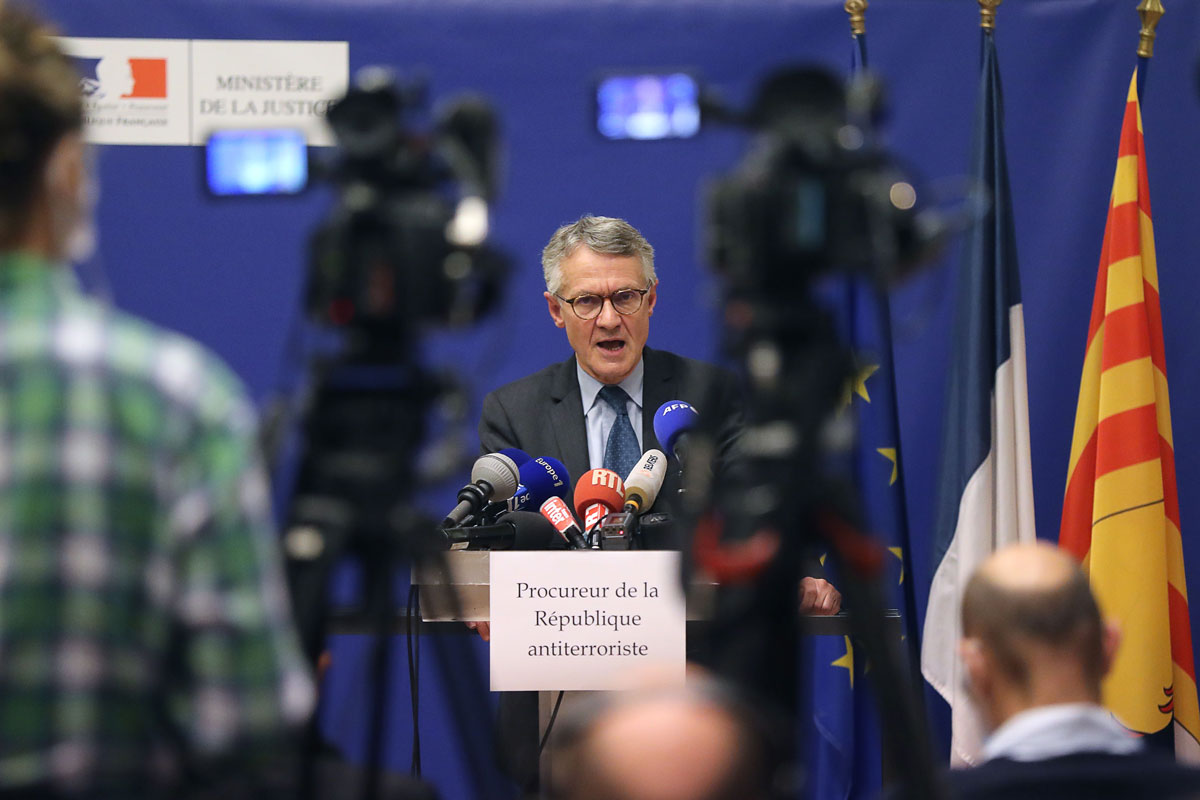
French anti-terrorism state prosecutor Jean-Francois Ricard delivers a press conference on October 29 in Nice, France. Valery Hache/AFP/Getty Images
The Nice attack suspect was carrying an Italian Red Cross document when he was taken down by police, French National Anti-terror Prosecutor, Jean-François Ricard, said Thursday.
Brahim Aouissaoui, who French authorities say entered the southern Italian city of Bari on Oct. 9, was unknown to French intelligence services and not in the national fingerprint file, according to Ricard.
“It painfully reminds us how much the deadly ideology of Islamist terrorism remains alive and well, as well as its will to attack our liberties, our most essential liberties, freedom of expression, freedom of teaching, freedom of worship,” he said at a news conference.
How the attack unfolded: Aouissaoui’s movements on the day of the attack, captured by video surveillance, show him arriving at the Nice train station and changing his clothes shortly after 8 a.m. local. He then walked 400 metres (1,312 feet) to the Basilica of Notre-Dame where he carried out the attack over the span of 28 minutes, killing three people.
The bodies of two people were found inside the basilica:
- A 60-year-old woman was found at the entrance to the basilica, with a “very deep throat cut like a decapitation,” he said.
- A 55-year-old man, who was officiating as Sacristan of the basilica, also died of a large throat wound.
The third victim — a 44-year-old woman who died in a restaurant nearby of several stab wounds — had fled the church and died a few minutes later.
Just under 30 minutes later, a team of four police officers arrived and shot Aouissaoui. The attacker, identified by Italian officials as Tunisian, had advanced towards them in a “threatening manner, shouting Allah Akbar, forcing them first to use an electric pulse pistol and then firing their service weapon several times,” the prosecutor said.
He added that 14 bullet cases were found on the ground.
Tunisia opens investigation into Tunisian suspect of Nice attack, says state-run media
From CNN’s Hamdi Alkhshali and AJ Davis
An investigation has been opened in Tunisia following Nice attack, Tunisia’s Public Prosecutor’s Office said Thursday according to state-run TAP news.
“According to the initial elements of the investigation, the assailant [is] a Tunisian national,” Mohsen Dali, deputy public prosecutor, said.
Dali added that the prosecutor’s office at the judicial counter-terrorism division has assigned the case to a specialized security unit for further research and investigation.
Earlier today, French authorities named Brahim Aouissaoui as the suspected attacker. He first arrived in Europe in September, a source briefed on the investigation told CNN.
Meanwhile, Tunisia’s Foreign Ministry condemned the attack in a statement. It expressed solidarity with the French government, its nationals, and offered condolences to the victims’ families.
Nice attack suspect is Tunisian and arrived in Italy in September
From CNN Terrorism Analyst Paul Cruickshank and Livia Borghese
A source briefed on the investigation told CNN the suspected attacker appears to have arrived in Europe on the Italian island of Lampedusa this September.
Separately, the source said that chatter in the last couple of weeks had raised concern within French security services that churches in France could be attacked.
The Italian interior ministry said Brahim Aouissaoui is Tunisian and was identified by Italian police in the southern city of Bari on Oct. 9.
Authorities gave him seven days’ notice to leave the country. He was not directly accompanied to the border as he didn’t have any previous criminal records, and was not reported by Tunisian authorities as a potential terrorist.
EU leaders encourage “understanding among communities and religion” following attack
From Zahid Mahmood in London
European Council leaders condemned the brutal attack in France and urged leaders around the world to work toward understanding and dialogue among communities and religions, rather than division.
In a joint statement issued by EU Council Chief Charles Michel, the 27 leaders said they were “shocked and saddened” by the attacks in France, adding they condemn the attacks in the “strongest possible terms,” which represent “attacks on our shared values.”
We stand united and firm in our solidarity with France, with the French people and the Government of France – in our common and continued fight against terrorism and violent extremism,” the statement said.
What we know so far about the attack
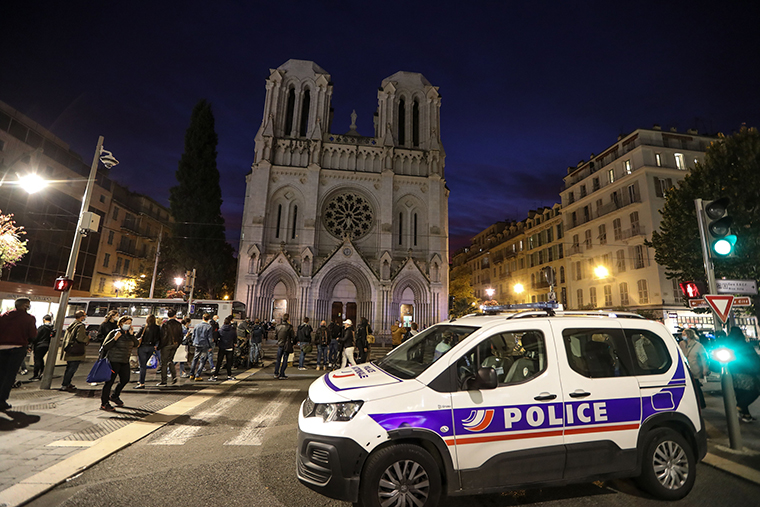
A Police vehicle is parked by the Notre-Dame de l’Assomption Basilica in Nice on Thursday, October 29. Valery Hache/AFP/Getty Images
More details are emerging about the Nice attack. Here’s what we know right now:
The incident
At least three people were killed in Nice, southern France, during a knife attack at the Notre Dame Basilica, the city’s main church.
Videos posted on social media showed police and military officers responding to the incident, setting up a cordon in the city center.
The victims
One of the victims had her throat slit, a police source told CNN. The mayor of Nice had earlier described it as a decapitation. Another victim – a man – died following multiple stabbings, according to the police source. The third victim, a woman, was wounded inside the church, but managed to leave. However, she died in a nearby café, the police source said.
The suspect
French national police named the attack’s suspect as Brahim Aouissaoui, born in 1999. A source in the Italian interior ministry told CNN that Aouissaoui first arrived in Europe on the southern Italian island of Lampedusa.
Nice’s mayor Christian Estrosi said the attacker was shot by police, but is still alive and has been taken into custody.
Estrosi said “everything points” to the incident being a terrorist attack, and France’s anti-terrorism prosecutor has taken over the investigation.
The reaction
French President Emmanuel Macron said the country will not give in to terrorism after once again coming under attack from what he called “Islamist and terrorist madness,” he said after visiting the scene of a deadly attack. The country’s terror alert level was raised to “emergency” following the incident.
International leaders have pledged solidarity with France, with the heads of Spain, Italy, Turkey, the UK and the European Parliament among those condemning the violence. The Vatican said Pope Francis is praying for victims. “Terrorism and violence can never be accepted,” it said in a statement.
The French Council of the Muslim Faith has also condemned the incident; as did the French Bishop’s Council, which said Catholics across France “refuse to give into fear” following the attack.
Authorities in Saudi Arabia, the United Arab Emirates and Egypt’s highest religious authority Al-Azhar have condemned the deadly knife attack in France on Thursday.
The Turkish government’s communications director, Fahrettin Altun, also condemned the attack but criticized the French leadership saying they should avoid inflammatory rhetoric against Muslims. Tensions have been tense between the two countries, with Turkey particularly critical of treatment of Muslims in France.
The background
The incident is the latest in a number of attacks to hit France in recent years, and comes less than two weeks after the beheading of teacher Samuel Paty in Paris. Paty was targeted after he used caricatures of Islam’s Prophet Muhammad during a lesson.
Nice has been the target of terror in the past. In 2016 dozens died after an ISIS-inspired attacker plowed a 20-ton truck into Bastille Day crowds.
JUST IN: Nice attack suspect identified by French police
From CNN’s Fanny Bobille in Paris and Livia Borghese in Rome
French national police have identified the suspect in Nice attack as Brahim Aouissaoui, who was born in 1999.
A source in the Italian interior ministry told CNN that Aouissaoui first arrived in Europe on the southern Italian island of Lampedusa.
Turkish official condemns Nice attack
From CNN’s Isil Sariyuce in Istanbul
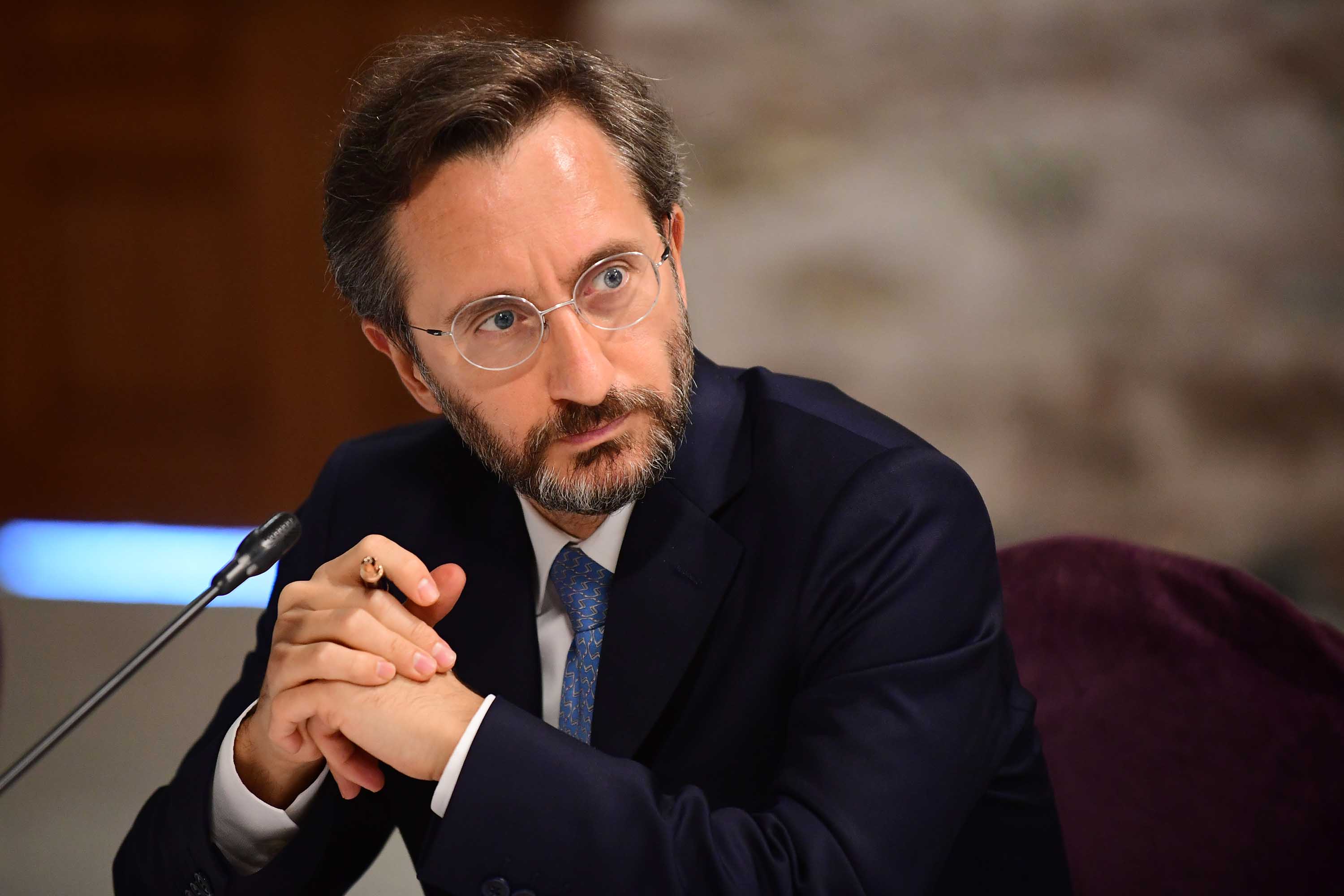
Turkey’s Communications Director Fahrettin Altun is pictured during a meeting in Istanbul, Turkey on September 7. Handout/Turkey’s Directorate Of Communications/Anadolu Agency/Getty Images
The Turkish government’s communications director, Fahrettin Altun, said that Turkey will continue to confront politicians who insult Islam, saying that the country “does not owe an apology to anyone for expressing strong opposition to racism and xenophobia.”
Altun “unconditionally” condemned the most recent terror attack in Nice, France and said that “such senseless violence has nothing to do with Islam or Muslims.”
However, Altun criticized the French leadership saying they should avoid inflammatory rhetoric against Muslims.
“We call on the French leadership to avoid further inflammatory rhetoric against Muslims and focus, instead, on finding the perpetrators of this and other acts of violence. Sensible parties in France must work on building bridges to prevent the creation of a hostile environment,” Altun said.
“We categorically deny any effort to associate us with any kind of violence.”
Some background: Tensions have been tense between the two countries, with Turkey particularly critical of treatment of Muslims in France. President Recep Tayyip Erdogan said on Wednesday that “we are going through a time in which anti-Islam and Muslim hatred is spreading like cancer among leaders in Europe.”
“We will not give in,” Macron says after visiting scene of attack
From CNN’s Fanny Bobille in Paris
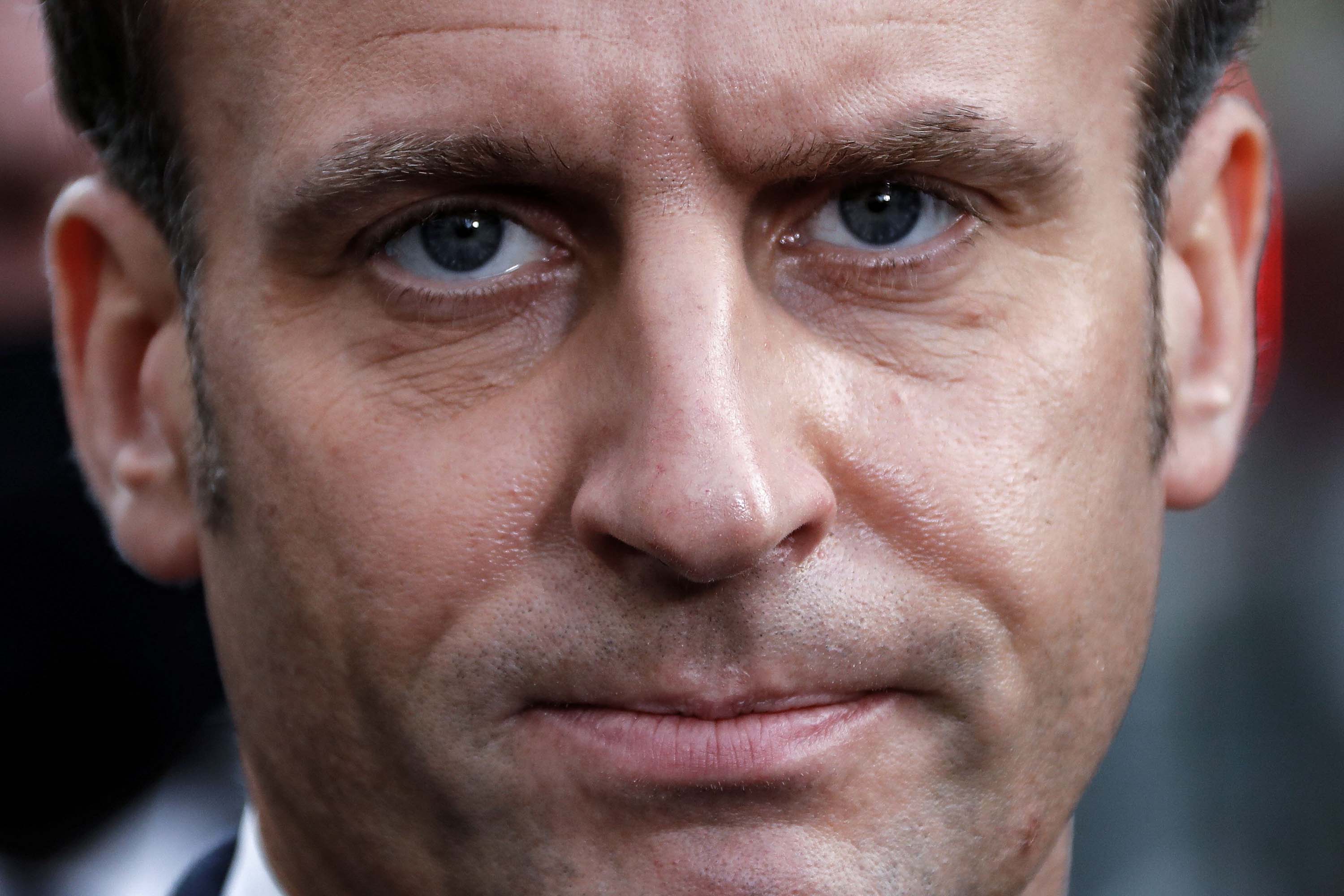
French President Emmanuel Macron said the country will not give in to terrorism after once again coming under attack from what he called “Islamist and terrorist madness.”
“I say this with the outmost clarity — we will not give in to terrorism,” he said after visiting the scene of a deadly attack in Nice.
“Once again this morning, it was three of our compatriots that fell in Nice, and very clearly France is under attack,” he added.
Macron said the country must use such incidents to unite, and not give into the “spirit of division.”
Catholics “won’t give into fear” after Nice attack, Bishop’s Council says
From CNN’s Gaëlle Fournier in Paris
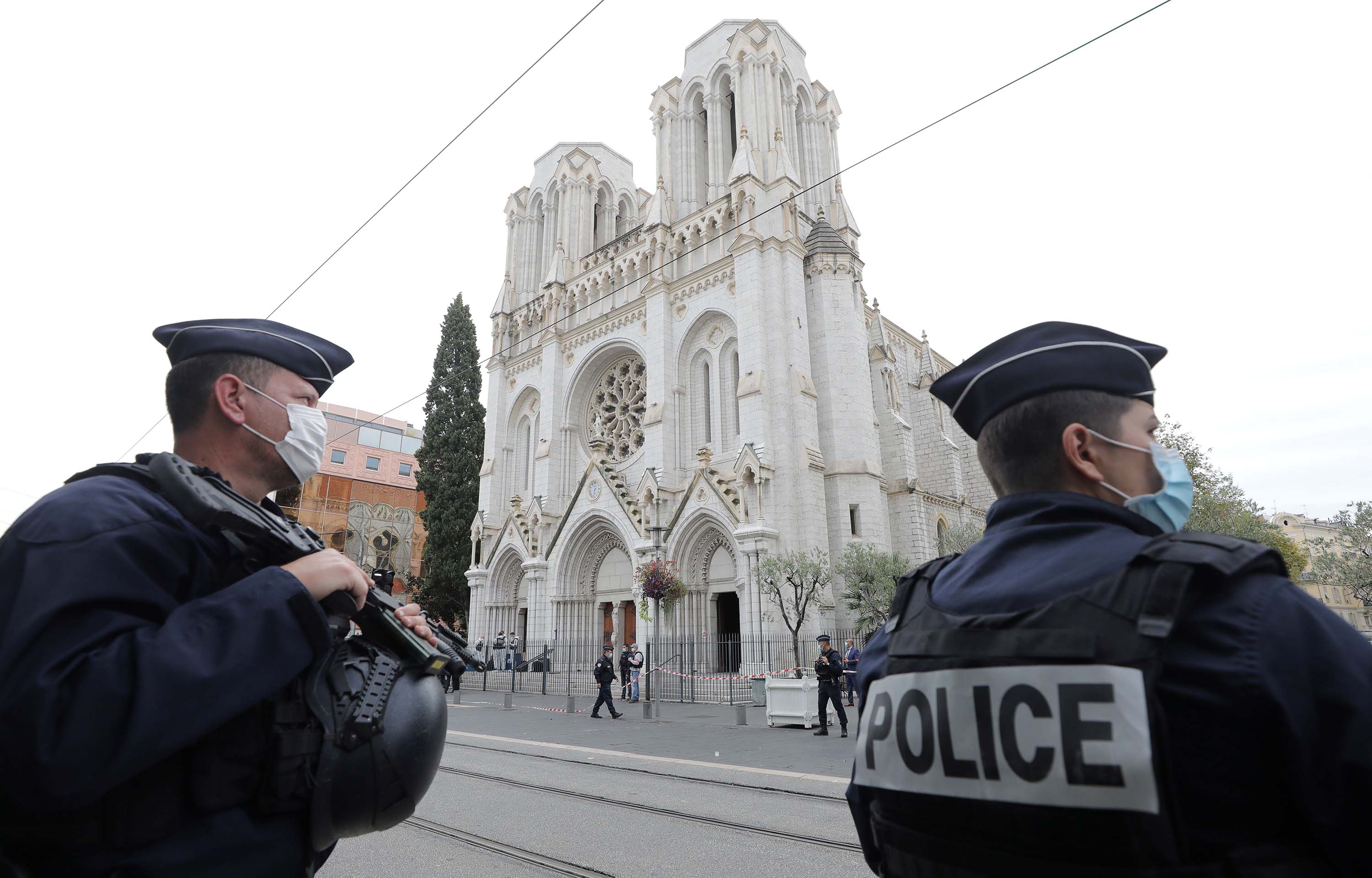
French policemen stand guard at the site of a knife attack at the Basilica of Notre-Dame de Nice on Thursday. Eroc Gaillard/AFP/Getty Images
Catholics across France “refuse to give into fear” following the knife attack at a church in Nice, the French Bishop’s Council has said.
“Through these awful acts, it is our entire country that is hit,” the Council said in a statement.
“This terrorism aims to set anxiety within our society. There is an urgent need to stop this gangrene and to regain the essential fraternity that will make us stand in front of these threats.”
The council said church bells rang out across the country at 3 p.m. local time (10 a.m. ET) in tribute to the victims.

